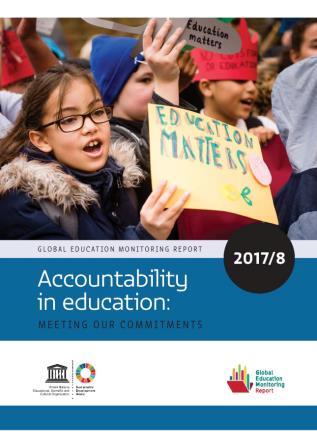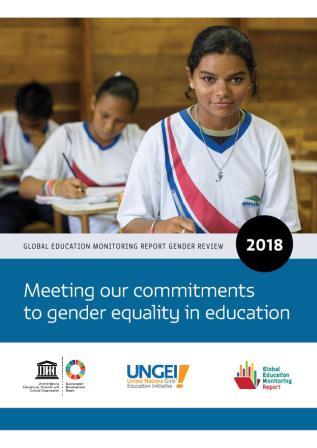
GEMR 2017/18 Accountability in education: meeting our commitments
In 2017, the second report in the Global Education Monitoring (GEM) Report series continues its assessment of progress towards the Sustainable Development Goal on education (SDG4) and its 10 targets, as well as other related education targets in the SDG agenda.
It also investigates accountability in education, analyzing how all relevant stakeholders can provide education more effectively, efficiently and equitably. The report examines different accountability mechanisms that are used to hold governments, schools, teachers, parents, the international community, and the private sector accountable for inclusive, equitable and quality education.
By analysing which policies make accountability work or fail, and which external factors impact on their success, the 2017/8 GEM Report concludes with concrete recommendations that will help build stronger education systems.
» Download the full report
» Download the summary report
» Download the press release
» Read the report online
» Find the country case studies
» Find additional resources here and here

GEMR 2017 Youth Report
The 2017/8 GEM Report ‘Accountability in Education: Meeting our commitments’ shows that youth play a vital role holding governments responsible for equitable quality education.
The fifth GEM Youth Report not only considers how accountability applies to, and can be applied by, young people, but also shares stories from notable young people around the world who are helping to hold their governments to account for quality, equitable education.

GEMR 2017 Gender Report
Only 44% of countries have made full legal commitments through international treaties to the cause of gender parity in education, according to this year’s Gender Review, published by the Global Education Monitoring (GEM) Report. This is the key finding of its sixth annual Review, which surveyed 189 States to assess whether they ensured that girls and women fully benefit from the right to education.
The Review, produced with the support of United Nations Girls’ Education Initiative (UNGEI), looks at the causes of slow progress towards gender equality in education, and how such issues may be addressed. Recalling countries’ legal commitments to the right to education for girls and women through international treaties, it focuses on three: the Convention on the Elimination of all Forms of Discrimination Against Women (CEDAW), the Convention against Discrimination in Education (CADE), and the International Covenant on Economic, Social and Cultural Rights (ICESCR).
